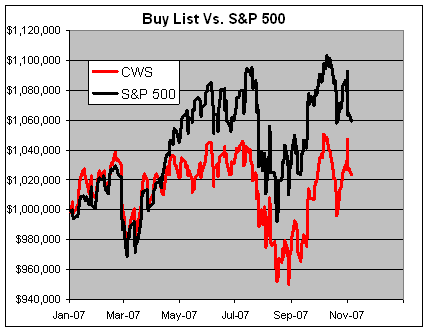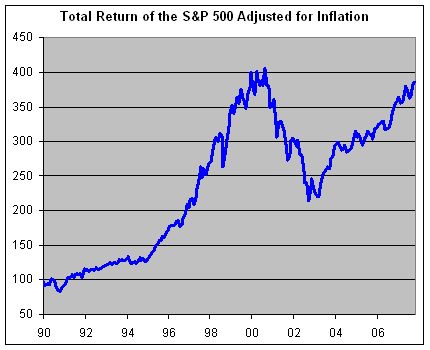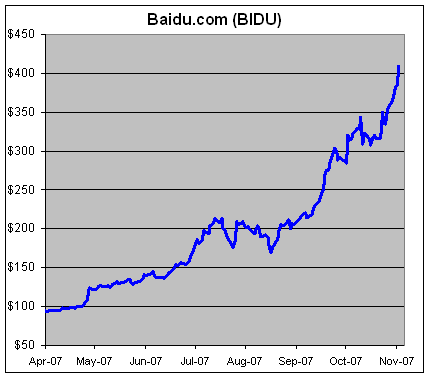-
Soros Sees Gloom and Doom
Posted by Eddy Elfenbein on November 6th, 2007 at 9:39 amGeorge Soros is out there predicting again. Of course, he’s famous for breaking the Bank of England in 1992 and making a cool billion in the process. So perhaps he’s worth listening to.
This time, Soros sees bad news for the United States. Very bad news.Billionaire investor George Soros forecast on Monday that the U.S. economy is “on the verge of a very serious economic correction” after decades of overspending.
“We have borrowed an awful lot of money and now the bill is oming to us,” he said during a lecture at the New York University, also adding that the war on terror “has thrown America out of the rails.”
Asked whether a recession was inevitable, Soros said: “I think we are definitely in for a slowdown that I think will be a bigger slowdown than (Fed Chairman Ben) Bernanke is seeing.”
Famous for his speculative attack on the Bank of England that made him more than $1 billion, Soros declined to nominate which currencies are more vulnerable currently. He also declined to comment specifically on the dollar.
“I know exactly where the currencies are going to but I’m not going to tell that to you,” he told the audience.According to Soros, we’re on the verge of a recession. Maybe, but I’m a bit skeptical. Soros said the same thing last year, and a recession didn’t come about. In fact, economic growth has accelerated for the past two quarters. Nine years ago, Soros said that the global capitalist system “is coming apart at the seams,” yet this could be the strongest world economy ever seen.
Still, if you constantly predict awful news, sooner or later, you’re going to be right. In my book, the doomdayers need to work on their timing. -
Mark Sellers at Harvard
Posted by Eddy Elfenbein on November 5th, 2007 at 5:11 pmFascinating talk. It’s a big long but well worth it. Here’s a sample:
I know that everyone in this room is exceedingly intelligent and you’ve all worked hard to get where you are. You are the brightest of the bright. And yet, there’s one thing you should remember if you remember nothing else from my talk: You have almost no chance of being a great investor. You have a really, really low probability, like 2% or less. And I’m adjusting for the fact that you all have high IQs and are hard workers and will have an MBA from one of the top business schools in the country soon. If this audience was just a random sample of the population at large, the likelihood of anyone here becoming a great investor later on would be even less, like 1/50th of 1% or something. You all have a lot of advantages over Joe Investor, and yet you have almost no chance of standing out from the crowd over a long period of time.
And the reason is that it doesn’t much matter what your IQ is, or how many books or magazines or newspapers you have read, or how much experience you have, or will have later in your career. These are things that many people have and yet almost none of them end up compounding at 20% or 25% over their careers. -
Buy List YTD
Posted by Eddy Elfenbein on November 5th, 2007 at 4:36 pm
It looks like our Buy List will trail the S&P 500 for the year. The good news is that we’ve closed the gap over the past few weeks.
For the year, the Buy List is up 2.31% while the S&P 500 is up 5.91%. These results don’t include dividends. The Buy List has been about 7.1% less volatile than the S&P 500.
Since August 28, the Buy List is up 5.42% compared with 2.62% for the S&P 500.
Most of our damage came during a six-week period in April and May when the S&P 500 rallied 5.10% and the Buy List dropped -0.87%. Ignore that and we’re doing fine! -
S&P 500 Adjusted for Dividends and Inflation
Posted by Eddy Elfenbein on November 5th, 2007 at 3:38 pm
We’re up a lot but still below the high. Historically, the S&P 500 with dividends has averaged about 7% a year more than inflation.
(Note: Since we don’t yet have the CPI number for October, I estimate a 0.2% rise in consumer prices.) -
Citigroup Vs. Google
Posted by Eddy Elfenbein on November 5th, 2007 at 3:23 pmGoogle (GOOG) now has a market value of $225 billion which is well ahead of Citigroup (C) at $175 billion. Citigroup, however, still has the lead in number of employees; 327,000 to 16,000.
-
Death Threats Against Analyst who Downgraded Citigroup
Posted by Eddy Elfenbein on November 5th, 2007 at 2:49 pmThe analyst whose downgrade of Citigroup Inc sparked a broad stock market sell-off on Thursday said she has received several death threats stemming from her research, the Times of London said.
Meredith Whitney of CIBC World Markets Inc late Wednesday downgraded Citigroup to “sector underperformer,” saying the largest U.S. bank by assets might need to raise more than $30 billion of capital and cut its dividend.
Her downgrade triggered a 6.9 percent drop in Citigroup’s shares on Thursday, leading to declines of 362 points in the Dow Jones industrial average and 2.6 percent in the Standard & Poor’s 500, the biggest drop since August.
It also led to renewed calls for Citigroup Chief Executive Charles Prince to step down.
“People are scared to be negative, especially when a company has such a wide holding,” Whitney told the Times of London in an article published Saturday.
“Clients are not pleased with my call and I have had several death threats,” she continued. “But it was the most straightforward call I’ve made in my career and I am surprised my peer analysts have been resistant. It’s so straightforward, it’s indisputable.”
Whitney did not immediately return requests for comment on Sunday. In 2005 she married John “Bradshaw” Layfield, a former World Wrestling Entertainment champion. CIBC World Markets is part of Canadian Imperial Bank of Commerce. -
Mystery Stock
Posted by Eddy Elfenbein on November 5th, 2007 at 2:00 pmThe New York Times reports:
The Boys and Girls Club of Pittsfield, Mass., relies, in part, on financial gifts to keep running. But officials were not sure they wanted to take a donation of poorly performing stock in a small company when it was offered two years ago, worrying about potential liability and risk to the organization. And club officials figured it would not net that much money, anyway.
Nevertheless, the club decided to accept the gift — which turned out to be the best decision the 107-year-old organization has ever made. The stock skyrocketed in value last year, and it was sold for $13.9 million in December 2006.
“It was basically worthless when we got it,” said John Donna, the club’s president. “I don’t think this happens once in a lifetime. It happens once in several lifetimes.”
The club, which serves thousands of youths in Pittsfield, a city of 45,000 in western Massachusetts, announced the windfall this week, saying it wanted to take time to consult with accountants and lawyers and invest the money in local savings accounts and certificates of deposit. It has created an advisory board to explore how to use the money. So far it has spent $500,000 on much-needed structural improvements to its building.
Mr. Donna said the club agreed not to disclose who donated the stock or the company, but he said the donor was “very happy this happened.”Well, Felix Salmon wonders what the stock is. He surmises:
If we can take Zezima’s story at face value, we can probably assume that
* The company was publicly listed at the end of 2005, but basically worthless – which probably means it went public at a much higher price some time before then.
* By the end of 2006, the company had skyrocketed in value, quite possibly by a factor of more than 1,000.
* Someone closely connected with the company has some kind of connection with Pittsfield, Mass.With that as my guide, my guess, and it’s a completely wild guess, is that the mystery stock is none other than…
-
Gisele Bündchen Refuses Dollars
Posted by Eddy Elfenbein on November 5th, 2007 at 1:34 pm
If you’re looking to hire the supermodel, no dollars please.The world’s richest model has reportedly reacted in her own way to the sliding value of the US dollar – by refusing to be paid in the currency.
Gisele Bündchen is said to be keen to avoid the US currency because of uncertainty over its strength.
The Brazilian, thought to have earned about $30m in the year to June, prefers to be paid in euros, her sister and manager told the Bloomberg news agency.
However, Ms Bündchen, 27, declined to comment on her pay arrangements.
Last week the dollar hit long-term lows against the euro, the British pound and the Canadian dollar.Update: The story is bogus. I’ll leave the photo up anyway to help drive traffic.
-
Sysco’s Earnings Up 16%
Posted by Eddy Elfenbein on November 5th, 2007 at 10:05 amSysco (SYY) reported decent earnings today. Even though the market had a sloppy open, SYY seems to be doing well.
For the company’s September quarter, which is its first quarter, Sysco earned 43 cents a share which is a nice improvement over the 37 cents it made last year. Wall Street was looking for 42 cents a share.
Sysco is a very sound company although earnings growth has been sluggish over the past few years. Only lately has the company seem to come to life. The stock was on my short list to get booted from the Buy List next year, but now I’m not so sure. -
PetroChina Becomes the World’s First Trillion Dollar Company
Posted by Eddy Elfenbein on November 5th, 2007 at 9:43 amWow!
PetroChina Co. almost tripled on its first day of trading in Shanghai, becoming the world’s first company to be valued at $1 trillion, more than Exxon Mobil Corp. and General Electric Co. combined.
PetroChina shares rose to 43.96 yuan from the sale price of 16.7 yuan, giving the state-owned oil producer a greater market value than the entire Russian stock market.
The rally makes PetroChina shares four times more expensive than those of Exxon, even though China’s biggest oil producer has a quarter of the revenue. China’s stock market was valued at less than $1.1 trillion before tripling this year and giving the communist nation five of the world’s 10 biggest companies.
PetroChina’s valuation is “an indication of China coming of age and also of its stock market bubble,” said Hugh Young, who oversees $50 billion at Aberdeen Asset Management Asia Ltd. in Singapore.Everyone made a big deal in February when the Chinese market dropped 9% in one day. Well, the Shanghai Composite has doubled since then.
Check out the stratospheric rise in Chinese search engine, Baidu.com (BIDU). The shares are going for 100 times next year’s earnings.

-
-
Archives
- April 2025
- March 2025
- February 2025
- January 2025
- December 2024
- November 2024
- October 2024
- September 2024
- August 2024
- July 2024
- June 2024
- May 2024
- April 2024
- March 2024
- February 2024
- January 2024
- December 2023
- November 2023
- October 2023
- September 2023
- August 2023
- July 2023
- June 2023
- May 2023
- April 2023
- March 2023
- February 2023
- January 2023
- December 2022
- November 2022
- October 2022
- September 2022
- August 2022
- July 2022
- June 2022
- May 2022
- April 2022
- March 2022
- February 2022
- January 2022
- December 2021
- November 2021
- October 2021
- September 2021
- August 2021
- July 2021
- June 2021
- May 2021
- April 2021
- March 2021
- February 2021
- January 2021
- December 2020
- November 2020
- October 2020
- September 2020
- August 2020
- July 2020
- June 2020
- May 2020
- April 2020
- March 2020
- February 2020
- January 2020
- December 2019
- November 2019
- October 2019
- September 2019
- August 2019
- July 2019
- June 2019
- May 2019
- April 2019
- March 2019
- February 2019
- January 2019
- December 2018
- November 2018
- October 2018
- September 2018
- August 2018
- July 2018
- June 2018
- May 2018
- April 2018
- March 2018
- February 2018
- January 2018
- December 2017
- November 2017
- October 2017
- September 2017
- August 2017
- July 2017
- June 2017
- May 2017
- April 2017
- March 2017
- February 2017
- January 2017
- December 2016
- November 2016
- October 2016
- September 2016
- August 2016
- July 2016
- June 2016
- May 2016
- April 2016
- March 2016
- February 2016
- January 2016
- December 2015
- November 2015
- October 2015
- September 2015
- August 2015
- July 2015
- June 2015
- May 2015
- April 2015
- March 2015
- February 2015
- January 2015
- December 2014
- November 2014
- October 2014
- September 2014
- August 2014
- July 2014
- June 2014
- May 2014
- April 2014
- March 2014
- February 2014
- January 2014
- December 2013
- November 2013
- October 2013
- September 2013
- August 2013
- July 2013
- June 2013
- May 2013
- April 2013
- March 2013
- February 2013
- January 2013
- December 2012
- November 2012
- October 2012
- September 2012
- August 2012
- July 2012
- June 2012
- May 2012
- April 2012
- March 2012
- February 2012
- January 2012
- December 2011
- November 2011
- October 2011
- September 2011
- August 2011
- July 2011
- June 2011
- May 2011
- April 2011
- March 2011
- February 2011
- January 2011
- December 2010
- November 2010
- October 2010
- September 2010
- August 2010
- July 2010
- June 2010
- May 2010
- April 2010
- March 2010
- February 2010
- January 2010
- December 2009
- November 2009
- October 2009
- September 2009
- August 2009
- July 2009
- June 2009
- May 2009
- April 2009
- March 2009
- February 2009
- January 2009
- December 2008
- November 2008
- October 2008
- September 2008
- August 2008
- July 2008
- June 2008
- May 2008
- April 2008
- March 2008
- February 2008
- January 2008
- December 2007
- November 2007
- October 2007
- September 2007
- August 2007
- July 2007
- June 2007
- May 2007
- April 2007
- March 2007
- February 2007
- January 2007
- December 2006
- November 2006
- October 2006
- September 2006
- August 2006
- July 2006
- June 2006
- May 2006
- April 2006
- March 2006
- February 2006
- January 2006
- December 2005
- November 2005
- October 2005
- September 2005
- August 2005
- July 2005
 Eddy Elfenbein is a Washington, DC-based speaker, portfolio manager and editor of the blog Crossing Wall Street. His
Eddy Elfenbein is a Washington, DC-based speaker, portfolio manager and editor of the blog Crossing Wall Street. His